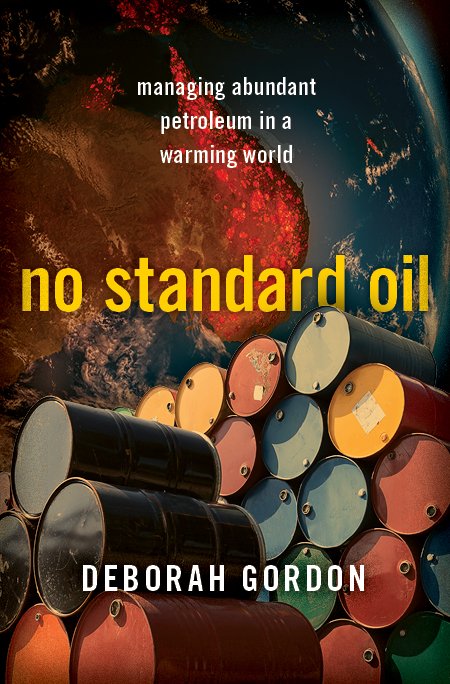Oxford University Press
Paperback Edition, 2025
Foreword by Jessica T. Mathews
Distinguished Fellow
Carnegie Endowment for International Peace
New Afterword
On wasting gas and emitting methane
In No Standard Oil, energy and environmental policy expert Deborah Gordon examines the widely varying climate impacts of global oils and gases, and proposes solutions to cut greenhouse gas emissions in this sector while making sustainable progress in transitioning to a carbon-free energy future.
The remaining years in this decade will be decisive in the fight against climate change. It will be impossible to hold the planet to avoid overheating the planet without controlling methane and CO2 emissions from the oil and gas sector. Contrary to popular belief, the world will not run out of these resources anytime soon. Absent low-emission substitutes for today’s plethora of petroleum products, if consumers continue to demand these abundant resources to fuel their cars, heat their homes, and produce everyday goods like shampoo, pajamas, and paint, emissions will continue to rise. Fueling future demand will be even more environmentally damaging using technologies like fracking oil and liquefying gas that can exacerbate methane emissions. Policymakers, financial investors, environmental advocates, and citizens need to understand what oil and gas are doing to our climate to inform decision-making.
In No Standard Oil, Deborah Gordon shows that no two oils or gases are environmentally alike. Each has a distinct, quantifiable climate impact. While all oils and gases pollute, some are much worse for the climate than others. In clear, accessible language, Gordon explains the results of the Oil Climate Index Plus Gas (OCI+), an innovative, public web tool that estimates global oil and gas life-cycle emissions. Gordon identifies the oils and gases from every region of the globe-along with the specific production, processing, and refining activities-that are the most harmful to the planet, and proposes innovative solutions to cut their energy waste and climate footprints.
Scientific measurements find unprecedented increases in atmospheric levels of the super-pollutant methane, which is over 80-times more warming than carbon dioxide over its decade-long lifetime. While methane is emitted by agriculture, waste, and energy sectors, its most vexing source arises from oil and gas production, processing, and transport. Methane—the main component in gas that is also co-produced with oil—is a valuable commodity. There’s no solid financial justification why so much human-made gas should be squandered when capturing it and selling it yields sizeable profits. Slashing oil and gas methane emissions addresses more than climate change. More efficient operations result in less energy waste and save costly resources. Containing explosive, noxious gas rather than spewing it reduces risks to public health and private property.
Global climate stabilization cannot afford to wait for oil and gas to run out—or for resources stop flowing and being consumed. No Standard Oil shows how we can take immediate, practical steps to cut greenhouse gas emissions in the crucial oil and gas sector while making sustainable progress in transitioning to a carbon-free energy future.
